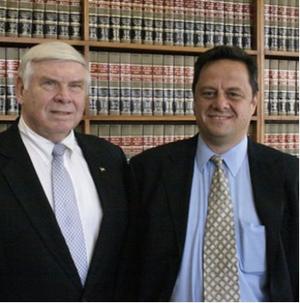Voice biometrics for mobile devicesVoiceKeyID from Porticus
Relative to other biometric technologies, the pace of adoption of voice biometrics has been rather slow; this may now change owing to an innovative solution from a Massachusetts-based company; Porticus offers a voice biometric authentication application which is not only robust and inexpensive, but which is uniquely suitable to an economy - and society - in which reliance on mobile devices is growing; there are some twelve vendors — none of them American — who offer voice identification software; Porticus, however, is the only company that has developed voice identification software that resides in the device itself rather than on the network; the solution also has intriguing military and intelligence applications

Russ Cramer (left), director of business development, Germano Di Mambro (right) co-founder and CEO of Porticus // Source: Anthony Nicaj
During the past ten years there has been a growing interest in, and adoption of, biometric solutions to bolster the security of private and government organizations as well as of individuals. Biometric information is now used in passports and driver’s licenses, ATMs and school cafeterias. This growing interest in biometric solutions notwithstanding, voice biometrics has not enjoyed the rapid adoption rate some had predicted for it early on.
The fortunes of voice biometrics may be changing. Here are two examples:
Voice stress analyzer. The name of the West Palm Beach-based center — the National Institute for Truth Verification (NITV) — may sound a bit Orwellian, but it is doing important work. A little more than twenty years ago, some of the best minds in voice biometrics began to develop the Computer Voice Stress Analyzer (CVSA) based on a technology called the Psychological Stress Evaluator. Progress on the new forensic voice biometrics system was slow owing to the stringent standards that the NITV used to validate their technology.
This approach paid off, however, as the CVSA is now relied upon by thousands of law enforcement agencies, including most major metropolitan police departments, and the U.S. military. The automatic scoring algorithm used by the CVSA took ten years to develop and is known as the Method for Quantifying Psychological Stress Levels Using Voice Samples. It was recently awarded a patent by the U.S. Patent Office.
CVSA was introduced to a largely skeptical law enforcement community in 1988. Law enforcement has been persuaded, and nearly 1,800 agencies have acquired the system, helping to solve tens of thousands of crimes — many of which after having gone cold. The Special Forces used CVSA successfully in Iraq to obtain actionable intelligence on the battlefield.
In a study of the technology, funded by the Department of Justice and conducted by a U.S. Air Force laboratory, the researchers reported their findings to the 38th Hawaii International Conference on System Sciences, held in 2005. The Air Force study found that the technology “is a viable alternative to the polygraph.” Additionally, a “U.S. Special Operations Command Independent Evaluation of the CVSA” found that “The majority of the agencies preferred the CVSA to the polygraph.” It also found that most of those agencies had discontinued the use of the polygraph.
Future prospects. The relatively slow adoption of voice biometrics has been the result of what some perceived as the technology’s
